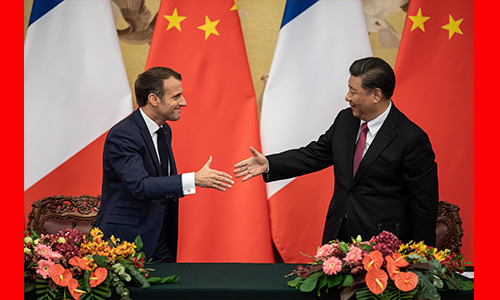China, Europe to stand united on free trade
To help forge new EU ties, defy rising protectionism

Chinese President Xi Jinping (right) shakes hands with French President Emmanuel Macron following a signing ceremony at the Great Hall of the People in Beijing on Wednesday. The two countries signed multibillion-euro deals covering agriculture, finance, aviation and energy, among others, with the aim of striking a balance in bilateral trade relations. Photo: AFP
China and France moved forward to deepening bilateral ties as both countries pledged to uphold multilateralism and free trade.
As one of the largest EU countries, France has further engagement with China, which may help forge new EU-China ties, and defy rising protectionism under the Trump administration.
Chinese President Xi Jinping on Wednesday held talks with French President Emmanuel Macron, vowing to work together to further advance the China-France comprehensive strategic partnership, look out to the world, the future and the people, and keep the partnership at the forefront of major-country relations, the Xinhua News Agency reported.
The two countries have been sharing core interests on climate change and biodiversity, taking joint action in the past two years, and the withdrawal of the US from the Paris Agreement only makes the China-French partnership in those areas more necessary, media reported.
After Xi and Macron met on Wednesday, China and France released an action plan to promote mutual trust, deal with climate change, support connectivity and encourage bilateral trade and investment, according to Xinhua.
The action plan also lays out traditional and emerging sectors that the two sides can collaborate on, as well as cultural and people-to-people exchanges.
This was the first time that two countries have laid out an action plan of its kind, considered an innovative move, analysts said. It's also the first plan of its kind signed between China and a developed country, showing that China is not isolated in the West, and that some Western countries recognize China's development philosophy, experts said.
"The plan highlights the word 'action,' which could be seen as a giant leap forward in bilateral relations between two countries, as both sides would take more concrete steps in carrying out different projects," Song Luzheng, a research fellow at the China Institute of Fudan University, said.
The plan states that the two heads of state would maintain an annual meeting mechanism, which is "unprecedented," Song said, noting that it would help strengthen political dialogue and enhance mutual trust, thus creating positive synergies for China-EU collaboration.
While the rise of unilateralism and protectionism in the US has brought great challenges to the world, Europe has also been facing a period of strategic adjustment with Brexit and growing right-wing populism, and a strong sign of support for globalization and multilateralism would inject confidence in bilateral and regional cooperation, analysts said.
Signed deals
The two countries signed 24 contracts worth a total of $15 billion, covering a wide range of industries, including aeronautics and civil nuclear, and also came up with a roadmap to reach concrete results by next year, Xinhua reported.
For instance, a two-way opening-up in the financial sector is encouraged, with expanded French agricultural exports to China, according to the plan. They also moved forward in traditional sectors like aviation. Both sides have agreed to take practical and effective measures for new initiatives on Airbus single-aisle and wide-body aircraft, according to a Memorandum of Understanding signed in Beijing on Wednesday.
Twenty French companies are expected to sell poultry, beef and pork to China, the most dynamic consumption market across the globe, and Macron also said the Chinese people would follow President Xi's example by trying French wine and food, media reported.
Besides traditional sectors, the two head of states encouraged deeper ties in advanced high-tech, pushing forward smart manufacturing while strengthening industrial competitiveness.
Reaching an action plan with China shows that the French president believes that simply relying on Europe to resolve the problems worldwide is not enough, said Zhang Bei, assistant research fellow at the Department for European Studies of Beijing-based China Institute of International Studies.
"Whether in trade or any other area, France and other European countries must forge a partnership with China to reach their goals," Zhang said.
China-EU ties
As one of the largest EU country, France has an important status in the bloc and great diplomatic ambitions.
"Since this year's European Parliament elections, the EU has been reshaping France's leadership in Europe," Dong Yifan, a research fellow at the Institute of European Studies of the China Institutes of Contemporary International Relations, said on Wednesday.
Because Germany faces political change in the post-Merkel era, the UK was engulfed in Brexit and Italy mired in internal conflicts, they cannot show sufficient leadership in the EU's external political actions, and this was when Macron, a president with idealism and liberalism, came forward in Europe, he noted.
China's trade with the EU reached $682 billion in 2018, with China's imports standing at $273 billion and exports at $409 billion, data from the Ministry of Commerce showed.
China, France and the rest of Europe are victims of US trade protectionism. Neither China nor Europe can bear the risk of being marginalized or the multilateral trade order breaking down, and the strengthening of ties between China and France made this point clearer, which would help accelerate talks on an investment pact between China and Europe, analysts said.
"The role France is playing in deepening relations with China will set an example for other European countries," Dong said, noting that the action plan can also be regarded as "a wind vane" of the improving relations between China and the EU.



